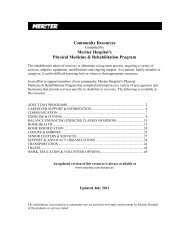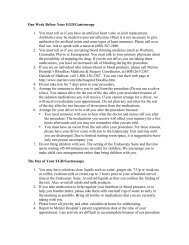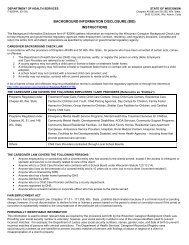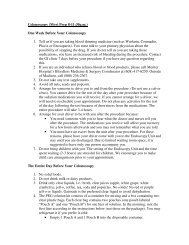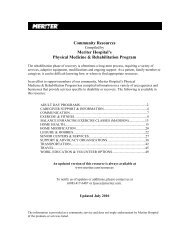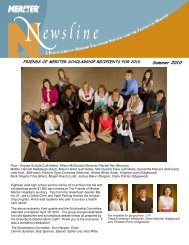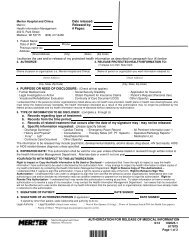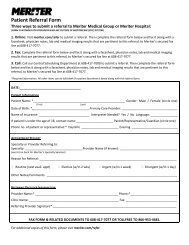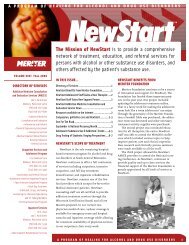A Guide To Your New Family's First Weeks - Meriter Health Services
A Guide To Your New Family's First Weeks - Meriter Health Services
A Guide To Your New Family's First Weeks - Meriter Health Services
Create successful ePaper yourself
Turn your PDF publications into a flip-book with our unique Google optimized e-Paper software.
• Audio monitors can be helpful for listening to<br />
sibling interactions.<br />
• Review your home’s childproof status. <strong>Your</strong> older<br />
child will have more alone time when you are busy<br />
with your baby.<br />
Common Adjustment Feelings And<br />
Behaviors<br />
When a new baby joins the family, it’s an adjustment<br />
for everyone. It is normal for older children to<br />
feel jealousy and anger, and to return to baby-like<br />
behaviors.<br />
It may seem kinder to “soften” consequences during<br />
this adjustment period. However, things will get back<br />
to normal faster if you stick with your regular limits<br />
and consequences. Remember, children thrive on<br />
predictable routines. Consequences for inappropriate<br />
behaviors should remain constant.<br />
Jealousy<br />
Being jealous of a new little brother or sister is<br />
natural—your older child does not want to share you!<br />
You can help your children overcome these feelings<br />
by reinforcing their sense of importance:<br />
• Take time to listen to and acknowledge feelings<br />
without being judgmental. Even when your hands<br />
are busy with the baby, your older children can<br />
have your eyes and ears. Letting children vent<br />
their negative feelings will reduce their feelings of<br />
jealousy and anger.<br />
• Let your older child help you care for the baby<br />
and feel part of the activity. At feeding time, pick a<br />
place where the older child can sit beside you.<br />
• Sometimes a special activity, short videotape, book<br />
on tape or snack can help your young helpers<br />
endure the baby’s feeding. Some children like to<br />
have their own doll to care for.<br />
• Spend “special time” alone with older children<br />
each day doing something they enjoy.<br />
• Give your older child a new privilege. Although<br />
it is sometimes hard to be the big brother/sister,<br />
remind older children that they can do things the<br />
baby cannot.<br />
• Praise older children for all their wonderful<br />
behaviors.<br />
Anger<br />
Many children feel anger at their parents as well as at<br />
the new baby. Parents can help the child vent anger<br />
in acceptable ways:<br />
• Acknowledge the child’s angry feelings, helping<br />
him put feelings into words rather than into<br />
physically harmful actions.<br />
• Remind your children that it’s not okay to<br />
hurt people, no matter how they feel. Use ageappropriate<br />
timeouts or privilege removal as<br />
consequences for behaviors such as hitting.<br />
• Help your children find ways to use up extra<br />
energy. Encourage physical activity such as playing<br />
outdoors.<br />
• Remember, tension is contagious. Remain calm.<br />
Regression<br />
Another common reaction among older children<br />
is returning to baby-like behaviors. They want to<br />
remain your baby, your focus. They see the baby<br />
getting lots of attention for dependent behaviors, so<br />
they want to become more dependent. Even schoolage<br />
children may request help with things they have<br />
normally done independently.<br />
• Treat regression matter-of-factly. Don’t punish<br />
these behaviors. Children may simply be curious<br />
and want to try the bottle, pacifier, etc.<br />
• Help them work it out by indulging them in<br />
the behavior. Then redirect them to their ageappropriate<br />
behaviors.<br />
• Praise their mature behaviors.<br />
• Make sure other caregivers understand and follow<br />
your approach to regressive behaviors.<br />
As a general rule, and as long as safety and sanity are<br />
in line, try to ignore the negative behaviors. Instead,<br />
praise, praise, praise the positive behaviors.<br />
56




